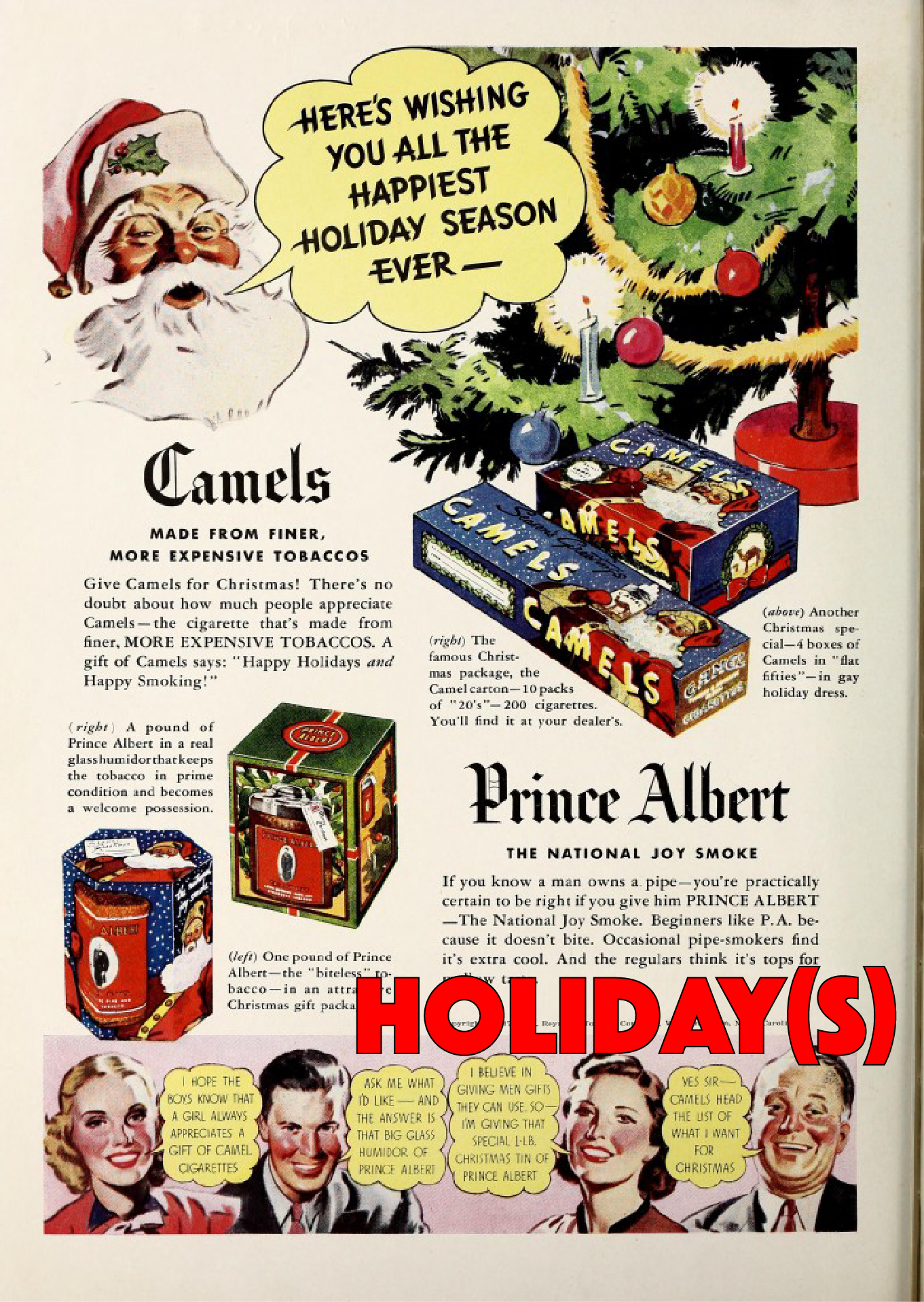
Less than 10 days until Christmas. There’s work to be done, and fires to stoke in our ongoing culture wars over the use of Holiday instead of Christmas to describe what many celebrate on and around the 25th of December.
The word holiday comes from the Old English haligdæg (around the 1200s) “holy day, consecrated day, religious anniversary; Sabbath,” from halig “holy” (see holy) + dæg “day”. Historical records show us that the word holiday began to be used in the 1400s to mean (see mean both “religious festival” and “day of exemption from labor and recreation.” Research shows that the phrase “Happy holidays” is from mid-1900s used in British English, with reference to summer vacation from school. British folks still say thins such as “What did you do for your holidays?” as opposed to our American “What did you do during your vacation?” It began to be used as a Christmastime greeting, by 1937, American English, in Camel cigarette ads.
The word holiday doesn’t appear in the Bible to describe such holy days. Rather the words feast (day) and festival are used to describe the three principal pilgrimage festivals: 1) Passover (celebrating the Exodus of the Jewish people from Egypt, and the beginning of the rains and planting season), 2) Shavuot (the Feast of Weeks, or Pentecost, principally an agricultural celebration at harvest time), and 3) Sukkot (the Feast of Tabernacles, celebrating the wandering of the Israelites in the desert for 40 years, when they had to rely only upon God for food and protection).
These main Israelite holidays were associated with a pilgrimage, a going to the Temple in Jerusalem usually to offer a sacrifice. It involved the whole family and the larger community. Following prayer and a sacrifice the remaining meat (most of the animal protein was given back to the worshipper after a very small part was burnt on the altar and a tithe portion was given to the priestly caste as payment). This was eaten in a Thanksgiving-like-meal celebration among family – a feast – hence the name.
Curiously we see in the words of the prophets, in particular, Isaiah, that this feast-celebration rooted in giving thanks to God degenerated (as is quite human) into a more gluttonous and self-serving celebration.
What to me is the multitude of your sacrifices? says the Lord; I have had enough of burnt offerings of rams and the fat of fed beasts; I do not delight in the blood of bulls, or of lambs, or of goats. … When you stretch out your hands, I will hide my eyes from you; even though you make many prayers, I will not listen; your hands are full of blood.
Wash yourselves; make yourselves clean; remove the evil of your doings from before my eyes; cease to do evil, learn to do good; seek justice, rescue the oppressed, defend the orphan, plead for the widow.
Is not this the fast that I choose: to loose the bonds of injustice, to undo the thongs of the yoke, to let the oppressed go free, and to break every yoke? Is it not to share your bread with the hungry, and bring the homeless poor into your house; when you see the naked, to cover them, and not to hide yourself from your own kin? Then your light shall break forth like the dawn, and your healing shall spring up quickly; your vindicator[a] shall go before you, the glory of the Lord shall be your rear guard. Then you shall call, and the Lord will answer; you shall cry for help, and he will say, Here I am.
If you remove the yoke from among you, the pointing of the finger, the speaking of evil, if you offer your food to the hungry and satisfy the needs of the afflicted, then your light shall rise in the darkness and your gloom be like the noonday. The Lord will guide you continually, and satisfy your needs in parched places, and make your bones strong; and you shall be like a watered garden, like a spring of water, whose waters never fail. Your ancient ruins shall be rebuilt; you shall raise up the foundations of many generations; you shall be called the repairer of the breach, the restorer of streets to live in.
If you refrain from trampling the sabbath, from pursuing your own interests on my holy day; if you call the sabbath a delight and the holy day of the Lord honorable; if you honor it, not going your own ways, serving your own interests, or pursuing your own affairs; then you shall take delight in the Lord, and I will make you ride upon the heights of the earth;
portions of Isaiah 1:11-17; Isaiah 58
And so the observation of a feast day, a festival, a holiday – or the well-wishing of a holy day – goes back to this notion of celebration, expression of gratitude for life, land, and love is closely associated with the doing of good, actively showing empathy and compassion for those in need, paying one’s gratitude forward. What better word is there to name a day in which God becoming human to free us from all bondage, broken-ness and spiritual blindness?
Questions for the practice of Examen & Contemplation
- For what are you grateful today?; in this Advent season?
- How do you express your gratitude during the holiday season of Advent and Christmas?